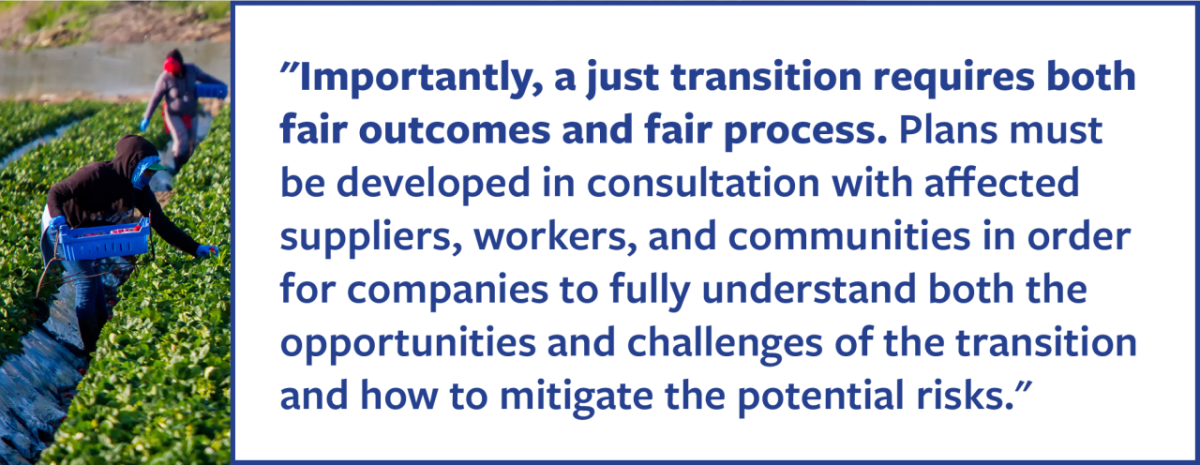What Companies and Investors Need to Know about a Just Climate Transition in the Food Sector
By Meryl Richards, Ceres Director, Food and Forests
There is much discussion around what a just transition looks like in sectors such as energy and industry, but one that has received less consideration is the food and agriculture sector – where it is a critical issue.
Responsible for approximately one third of global greenhouse gas emissions, the food sector is a critical player in the transition to a lower emissions economy, as well as acutely exposed to the impacts of climate change. Under increased pressure from consumers and investors to address these risks, more companies are announcing their climate transition plans, including many leaders in the food and agriculture sector.
In creating their climate transition plans, food companies must address risks to the most critical actors in the sector: farmers and farmworkers. A just transition means supporting farmers and farmworkers in the transition to lower emissions modes of production, along with addressing the physical impacts of climate change
Not only does their work underpin the sector’s supply chain, but these individuals will have ultimate responsibility for making the necessary changes to protect our food system from climate change and reduce emissions from agricultural production. By supporting them in doing so, companies can help create agricultural production models that are more sustainable, regenerative, and profitable than the current one.
Building on Ceres Roadmap 2030 and the CA100+ Just Transition indicator, a new report from Ceres discusses the importance of ensuring the climate transition in the food and agricultural sector is fair and equitable for farmers and farmworkers. Climate Transition Plans in the U.S. Food Sector: Addressing Risks to Farmers and Farmworkers outlines the business case for assessing and tackling risks impacts to these groups and offers guidance to companies and investors on what effective just and inclusive transition plans should include.
The business case for addressing risks to farmers and farmworkers
Food companies must understand and address the impacts of both climate change and the transition to lower emission production methods on farmers and farmworkers because they pose significant business risks that could destabilize entire supply chains.
Climate change is creating dangerous heat conditions for farmers and farmworkers. In the U.S., for instance, extreme heat already threatens the health of farmworkers and exacerbates labor shortages, with temperatures regularly exceeding 100°F during the labor-intensive harvest season in the West and South. Farmers and farmworkers in the Global South face similar risks, made more severe by the predicted intensity of climate impacts and existing conditions such as poverty and food insecurity.
Increased heat and precipitation changes — along with catastrophic storms – are also already reducing agricultural yields and causing geographic shifts in crop production. Such impacts have the potential to disrupt supply chains as well as put economic strain on farmers and rural communities, with more severe impacts for BIPOC and smallholder farmers.
Meanwhile, technologies that can help increase resilience and reduce emissions, such as precision agriculture to reduce fertilizer-induced emissions or feed additives to tackle enteric methane, have the potential to create new jobs but also require initial or ongoing investments on-farm. The shift to less emission-intensive sourcing may reinforce inequalities by privileging wealthier farmers who have the resources to manage the costs and potential risk of new technologies. Such a shift has the potential to exclude groups disadvantaged by racism or discrimination, such as BIPOC and Indigenous farmers, women, and those without secure land tenure.
What companies can do to ensure a just and inclusive transition
The transition to more resilient and lower-emissions modes of production can bring new business opportunities, but companies need to support farmers and farmworkers to fully realize those benefits. The report explains concrete actions that companies can take to help craft climate transition plans that are equitable and inclusive.
Companies can start by understanding and acknowledging addressing risks to farmers and farmworkers within their supply chain and committing to addressing them. If companies do not have a human rights policy, they should develop one in line with the United Nations’ Guiding Principles on Business and Human Rights. That policy should be complemented by formal recognition of the unique challenges that climate change poses for farmers and farmworkers and the potential effects of the company’s transition strategy on those groups and a commitment to reduce emissions in line with recognized just transition principles.
In developing transition plans, companies should include plans to address climate risks to farmers and farmworkers. Components of such plans may include strategies to share the cost of the transition to climate smart practices by providing financial and technical assistance and retaining, upskilling, or compensating affected workers. Companies should also support policy and regulations that support farmers and farmworkers in improving the resilience of agricultural systems and reducing agricultural GHG emissions, as well as legislation that protects farmworkers from dangerous conditions.
Importantly, a just transition requires both fair outcomes and fair process. Plans must be developed in consultation with affected suppliers, workers, and communities in order for companies to fully understand both the opportunities and challenges of the transition and how to mitigate the potential risks.
Finally, companies should develop clear key performance indicators to track progress on their just transition commitments and disclose regularly against those indicators.
While the food and agriculture sector urgently need transformation, companies must ensure that climate transition plans are just and equitable for all its stakeholders, especially the ones who the sector most depends on. By taking these actions, companies can help generate the most benefits – both as a corporation and for the farmers and farmworkers in their supply chains.



